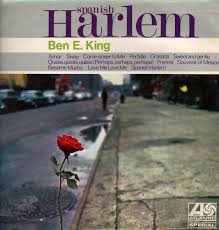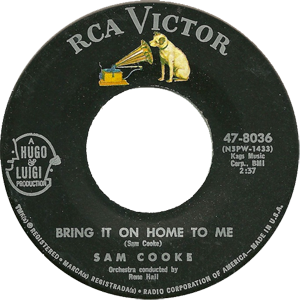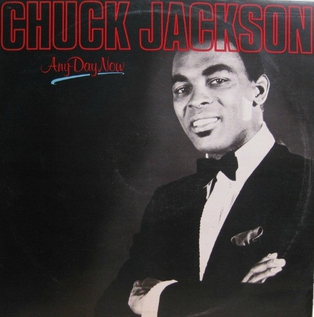Related Research Articles

"Spanish Harlem" is a song recorded by Ben E. King in 1960 for Atco Records. It was written by Jerry Leiber and Phil Spector and produced by Jerry Leiber and Mike Stoller. "Spanish Harlem" was King's first hit away from The Drifters, peaking at number 15 on Billboard's rhythm and blues and number 10 in pop music chart.

"Ooo Baby Baby" is a song written by Smokey Robinson and Pete Moore. It was a 1965 hit single by the Miracles for the Tamla (Motown) label.

"I Say a Little Prayer" is a song written by Burt Bacharach and Hal David for Dionne Warwick, originally peaking at number four on the U.S. Billboard Hot 100 pop singles chart in December 1967. On the R&B Singles chart it peaked at number eight. The following year, it was a top ten hit for Aretha Franklin.

"You Send Me" is a song written and originally recorded by American singer Sam Cooke, released as a single in 1957 by Keen Records. Produced by Bumps Blackwell and arranged and conducted by René Hall. The song, Cooke's debut single, was a massive commercial success, becoming a No. 1 hit on both Billboard's Rhythm & Blues Records chart and the Billboard Hot 100.

"Bring It On Home to Me" is a song by the American soul singer Sam Cooke, released on May 8, 1962, by RCA Victor. Produced by Hugo & Luigi, and arranged and conducted by René Hall, the song was the B-side to "Having a Party". The song peaked at number two on Billboard's Hot R&B Sides chart, and also charted at number 13 on the Billboard Hot 100. The song has become a pop standard, covered by numerous artists of different genres. It is one of The Rock and Roll Hall of Fame's 500 Songs that Shaped Rock and Roll.

"Until You Come Back to Me (That's What I'm Gonna Do)" is a song written by Morris Broadnax, Clarence Paul, and Stevie Wonder. The song was originally recorded by Stevie Wonder in 1967, but his version was not released as a single and did not appear on an album until 1977's anthology Looking Back. The best-known version of this song is the 1973 release by Aretha Franklin, who had a million-selling top 10 hit on Billboard charts. The song reached No. 1 on the R&B chart and No. 3 on the Hot 100 the week of February 23, 1974. It became an RIAA Gold record.
"I'm in Love" is a song written by Bobby Womack. It was first recorded by Wilson Pickett in 1967, which gave him a top-ten R&B hit on Billboard's chart in 1968, peaking at number 4 as well as peaking at number 45 on the Billboard Hot 100.

"Chain Gang" is a song by American singer-songwriter Sam Cooke, released as a single on July 26, 1960.

"Through the Years" is a song written by Steve Dorff and Marty Panzer, and recorded by American country music artist Kenny Rogers. It was released in December 1981 as the fourth and final single from the album Share Your Love.

"Another Saturday Night" is a 1963 hit single by Sam Cooke from the album Ain't That Good News. The song was written by Cooke while touring in England when staying in a hotel where no female guests were allowed. It reached No. 10 on the Billboard Hot 100 and was No. 1 on the R&B chart for a single week. In the UK, the song peaked at No. 23 on the UK Singles Chart. In Canada it reached No. 30.
"That Lucky Old Sun (Just Rolls Around Heaven All Day)" is a 1949 popular song with music by Beasley Smith and words by Haven Gillespie.
"(Now and Then There's) A Fool Such as I" is a popular song written by Bill Trader and published in 1952. Recorded as a single by Hank Snow it peaked at number four on the US country charts early in 1953.
"Since I Met You Baby" is an American rhythm and blues song written and recorded by pianist Ivory Joe Hunter. The song, which Hunter recorded in 1956, became an American standard, and saw renewed popularity in 1969 when country music artist Sonny James released his hit version.

"Cupid" is a song by the American singer Sam Cooke, released on May 16, 1961. It charted at number 17 on the Billboard Hot 100 and number 20 on the Hot R&B Sides chart; the track performed best in the United Kingdom, peaking at number seven on the UK Singles Chart. The song is featured on Cooke's greatest hits album, The Best of Sam Cooke (1962). Cooke's producers had asked him to write a song for a girl they had seen on a Perry Como TV show—but once they heard her sing, they kept "Cupid" for Cooke himself.

"Lookin' for a Love" is a song written by J. W. Alexander and Zelda Samuels and was the debut hit of the family group the Valentinos, which featured Bobby Womack. The song was a hit for the Valentinos, climbing to number eight on the R&B chart and crossing over to number 72 on the Billboard Hot 100 in 1962, released on Sam Cooke's SAR label. The song became a much bigger hit when Womack issued a solo version in 1974; this version reached number one on the R&B chart and number ten on the Billboard Hot 100. As well, an interim version of "Lookin' for a Love" by the J. Geils Band in 1971 was a top-40 hit for them, peaking at number 39.

"Any Day Now" is a popular song written by Burt Bacharach and Bob Hilliard in 1962. It has been recorded by numerous artists over the years, including notable versions by Chuck Jackson in 1962, Alan Price in 1965, Elvis Presley in 1969, Scott Walker in 1973 and Ronnie Milsap in 1982. In the lyrics, the singer predicts the imminent demise of a romantic relationship and describes the sadness this will leave.

"Baby I Love You" is a popular song by R&B singer Aretha Franklin. The only single release from her Aretha Arrives album in 1967, the song was a huge hit, peaking at number 4 on the Billboard Hot 100 Singles chart and spending two weeks at number-one on the Hot Rhythm & Blues Singles chart. In the UK, the song rose to number 39 in August 1967, spending four weeks on the chart. It was featured in Martin Scorsese's 1990 film Goodfellas. A live performance appears on the album Aretha in Paris (1968).

"She's All I Got" is a song written by Gary U.S. Bonds and Jerry Williams Jr. It has been recorded by several artists. The first version, released in 1971 by Freddie North, was a Top 40 U.S. pop hit, and a version by Johnny Paycheck was a number 2 U.S. country hit that same year. A second country music version was released on Conway Twitty's 1972 Decca LP I Can't See Me Without You. There was also a version titled "He's All I Got" that was on Tanya Tucker's 1972 album Delta Dawn. Yet another cover titled "Don't Take Her She's All I've Got" was released by Tracy Byrd, whose version reached number 4 on the U.S. and Canadian country singles charts. Co-author Jerry Williams Jr., aka Swamp Dogg, released his own version on his 2020 album Sorry You Couldn’t Make It.

"Then You Can Tell Me Goodbye" is a song written by John D. Loudermilk. It was first released in 1962 by Don Cherry, as a country song and again as a doo-wop in 1967 by the group The Casinos on its album of the same name, and was a number 6 pop hit that year. The song has since been covered by Eddy Arnold, whose version was a number 1 country hit in 1968, and by Neal McCoy, whose version became a Top 5 country hit in 1996.

"Only Sixteen" is a song by American singer-songwriter Sam Cooke, released in May 1959. It was a top 15 hit on Billboard's Hot R&B Sides chart and also charted within the top 30 of the Billboard Hot 100 and the UK Singles Chart. In the UK it was covered, and taken to No. 1, by Craig Douglas.
References
- ↑ Marsh, Dave (March 1971). "Sam Cooke: 'This is Sam Cooke'" . Creem . Retrieved June 22, 2018– via Rock's Backpages.
- ↑ Whitburn, Joel (2004). Top R&B/Hip-Hop Singles: 1942-2004. Record Research. p. 134.
- ↑ "Sam Cooke Chart History (Hot 100)". Billboard.
- 1 2 Whitburn, Joel (2008). Hot Country Songs 1944 to 2008. Record Research, Inc. p. 372. ISBN 978-0-89820-177-2.
- ↑ "Top RPM Country Tracks: Issue 7997." RPM . Library and Archives Canada. August 18, 1990. Retrieved August 23, 2013.
- ↑ "Dan Seals Chart History (Hot Country Songs)". Billboard.
- ↑ "RPM Top 100 Country Tracks of 1990". RPM . December 22, 1990. Retrieved August 23, 2013.
- ↑ "Best of 1990: Country Songs". Billboard . Prometheus Global Media. 1990. Retrieved August 23, 2013.
- 1 2 Dolan, Jon (2018-08-17). "Aretha's Greatest Albums: 'I Never Loved a Man the Way I Love You' (1967)". Rolling Stone. Retrieved 2024-05-03.
- ↑ Bogdanov, Vladimir (2003). All Music Guide to Soul: The Definitive Guide to R&B and Soul. Hal Leonard Corporation. p. 256. ISBN 978-0-87930-744-8.